This post may contain affiliate links. If you make a purchase through a link, I may receive a small commission, at no cost to you. These commissions help keep this website up and running, and I thank you for your support. Read my full disclosure here.
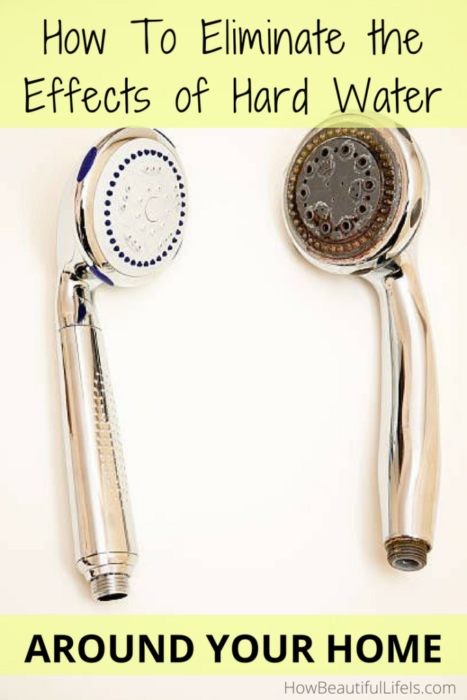
What is Water Hardness?
Water hardness refers to the level of calcium and/or magnesium minerals that water contains. The higher the mineral content, the harder the water. If it contains few or no minerals, it is referred to as soft water. Dealing with hard water can be a nuisance. It interferes with almost every household task from laundering and dishwashing to personal grooming.
Hard water causes two problems:
Limescale: When hard water is heated, it forms a scale of calcium and magnesium minerals. This is referred to as limescale.
Soap scum: When hard water comes into contact with detergent it forms lime soap, also known as soap scum.
Both limescale and soap scum build up on surfaces causing breakdowns, shortening the lifespan of appliances and clogging pipes. Unfortunately most of us have no control over our water hardness because we rent or can’t afford the high cost of a water softening system. But that’s ok, because I’m going to share with you how to manage the effects of limescale and soap scum around the house.
How Hard Is My Water?
To find out your water hardness, contact your local council or water provider (these days this information is usually published online). Signs of hard water are usually quite obvious, such as:
- Soap scum ring around the bath
- White residue on the taps, shower head and inside the kettle.
The Effects of Hard Water on Dishwashers
Hard water causes dishes and glasses to become spotted. Glass is particularly affected and becomes coated in a hazy film. The inside of the machine can be left with a white coating of mineral buildup and the pipes can get clogged with limescale and soap scum. For some people, this problem has been exacerbated by the removal of phosphates from dishwashing detergents. This was great for the environment, but not so good for the cleaning performance of detergents and led many people to blame their dishwasher.
How to Resolve Hard Water Problems in Dishwashers
- Purchase a dishwashing detergent formulated for hard water.
- Include water softeners such as Lemi Shine Dishwasher Detergent Booster in every wash cycle to remove hard water stains and deposits from your dishes and glassware and also keep your machine free of build up.
- White vinegar and lemon juice are a good natural alternative to commercial rinse aids and will get your glass looking shiny again. Fill your rinse aid compartment with a mix of 1 cup of white vinegar and 1 tablespoon of lemon juice. Because vinegar is an acid, it can pit the surface of some synthetic rubber seals. Full-strength vinegar should be avoided for seals made from polyacrylate, fluorosilicone and Buna-N because it may weaken them. Long-term use could cause eventual failure so always read your dishwasher manual as the manufacturer will usually stipulate whether it can be used in the machine.
- Run regular monthly cleaning cycles through your dishwasher to remove any remaining limescale and soap scum build up. Vinegar may not be acidic enough to remove really tough build up. Instead, set the machine to its highest temperature and add 2 tablespoons of citric acid to the detergent dispenser and run an empty cycle. The hot water will help to sanitize the machine.
- Regularly remove and clean the filters.
The Effects of Hard Water on Kettles
Our kettles can be ruined by limescale. So can our appetites when we see the disgusting, scaly insides of the kettle as we are about to make ourselves a nice hot drink. Most kettles come with a filter attached to the pouring spout which stops any limescale getting into your cup, but the only way to really fix this problem is to regularly clean the kettle properly to remove all of the limescale.
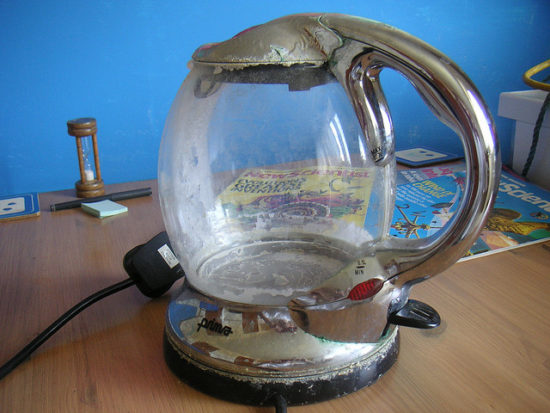
How to Resolve Hard Water Problems in Kettles
Remember that you drink from the kettle, so you need to be careful what you use to clean it. A simple and natural solution is to use white vinegar, lemon juice or citric acid. Fill the kettle with:
- Half vinegar and half water or
- Half a cup of lemon juice and the rest water or
- 1 tablespoon of citric acid and the rest water
Bring it to the boil and then leave it to soak for an hour. Once the hour is up, empty the kettle and thoroughly rinse it out to ensure there is no residue left that could affect the taste of the water. If there is still limescale residue, wipe it out with baking soda and a damp cloth. You may need to repeat this process if your kettle is heavily encrusted with limescale.
The Effects of Hard Water on Clothes Irons
Limescale build up can also affect your clothes iron. It can block the water reservoir and the steam vents which may cause it to overheat and degrade. This can lead to the iron spitting rusty brown water all over your clothes, which is extremely frustrating – who has time to be re-washing clothes?
How to Resolve Hard Water Problems in Clothes Irons
Don’t use a salt based water softener as this can cause erosion and potentially block the filter. Instead, purchase some distilled water. It’s cheap and will greatly extend the life of your iron.
The Effects of Hard Water on Washing Machines
Hard water can affect a washing machine in many different ways, shortening its lifespan and causing breakdowns. The heating element in your machine can become crusted with limescale and cause it to fail over time. Both limescale and soap scum can build up in the washing machines drums, pipes and hoses. It can also promote microbial growth inside the machine which could put you and your family’s health at risk.
How to Resolve Hard Water Problems in Washing Machines
Regularly run cleaning cycles through your machine using 1 quart (1 liter) of vinegar and ½ cup of baking soda. This may not be strong enough to remove tough limescale and soap scum, so try using 1 cup of citric acid crystals instead. Make sure that you set your machine to the hottest wash cycle to sanitize and run an extra rinse cycle to remove any residue. Alternately, you can purchase a commercial product such as Lemi Shine Machine Cleaner that is specially designed to remove tough limescale and build up.
Learn more about how to clean a washing machine here.
The Effects of Hard Water on Laundry
When hard water comes into contact with the laundry detergent it forms lime soap, also known as soap scum. This can cause hard water stains and leave clothes feeling stiff, scratchy, and looking dingy.
Hard water also reduces the efficacy and concentration of laundry detergent because some of it is used to bind the calcium and magnesium to soften the water. As a result soil is not completely removed from the fabrics and whites can turn grey and dingy and colors dulled. Continuous laundering in hard water can shorten the life of clothes.
If you use chlorine bleach on your laundry, then do so with caution. It can cause yellowing when used with hard water. Some hard water also contains high levels of iron which reacts with chlorine to make iron oxide, resulting in rust stains on your fabrics.
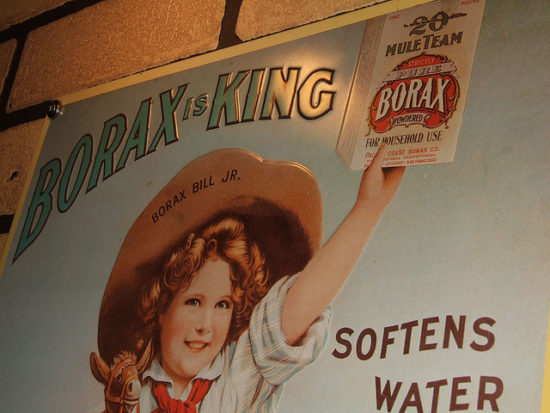
How to Resolve Hard Water Problems in Laundry
- To ensure the correct dose of laundry detergent, always check the directions on the product label. The harder the water, the more detergent that you need to use.
- You can save money on detergent by softening the water. Add a water conditioner such as Calgon Water Softener or ½ cup of borax to each wash cycle. Borax is also an excellent laundry boost as it removes stains, disinfects and deodorizes.
- Instead of using chlorine bleach, try adding half a cup of either white vinegar or lemon juice to your rinse cycle. Both are safe to use and also help to remove limescale from your machine. Oxygen bleach is also an excellent natural whitening product that works well in hard water. Click here to discover 10 ways to whiten and brighten laundry.
- To remove rust stains caused by hard water, use specialty products like Iron Out Rust Stain Remover.
How to Resolve Hard Water Problems in the Bathroom
Limescale and soap scum clog water pipes and fixtures, reducing water flow and ultimately causing expensive repairs.
Common signs of hard water wear:
- Soap scum film on bathroom surfaces e.g. shower glass, a ring around your bath.
- Toilet flushing units
- Taps, sinks and shower heads get white deposits and blocked with limescale
- Water flow may be reduced by limescale deposits in pipes.
- Those with hard water containing iron may also find rust stains in toilets and baths etc…
Tips
- Reducing your water temperature to 60ºC (140ºF) or lower can decrease scale deposition.
Rust Stains
Rust stains can be removed using citric acid. Leave the affected area soaking in a solution of citric acid overnight and then scrub clean. You may need to repeat the treatment for heavy rust stains.
If you want to use a commercial product, you can try the Iron Out Rust Stain Remover.
Limescale
To clean limescale from fixtures, use a professional cleaning product that is designed to work with limescale. You can also make your own natural limescale cleaning product using 10 ounces (100g) of citric acid mixed with 1 quart (1 litre) of hot water.
To clean taps, soak cloth in cleaning solution and wrap it around the tap and leave it to soak for an hour before giving it a scrub with an old toothbrush. Use caution when using acid based products like vinegar and citric acid as it can eat away at the enamel on old baths and sinks.
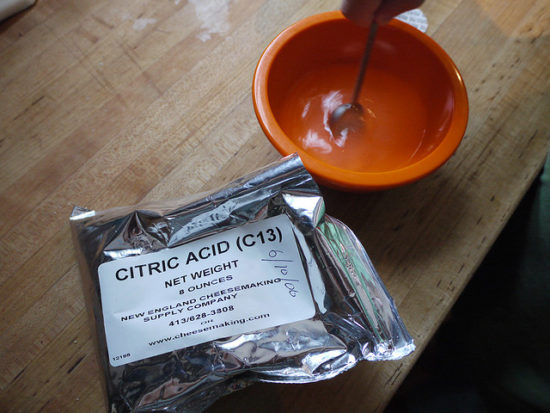
SHOWER HEAD
Immerse the shower head in a dilution of 1 tablespoon of citric acid dissolved into 2 cups of hot water or 1 cup of white vinegar mixed with 1 cup of hot water. If you can’t remove the shower head, you can try tying a plastic bag with the acid water mix over the head and securing it with a rubber band. Leave for one hour and then gently scrub using an old toothbrush.
TOILET
To clean limescale from toilets, use a gel bleach toilet cleaner. Apply it as close as you can to the water deposits, squirting upwards under the rim and into the bowl as well. Leave it to soak for at least half an hour before giving it a good scrub with the toilet brush and then flush clean.
For a natural alternative, sprinkle either ½ cup of white vinegar and ½ cup of borax or 1 cup of citric acid all over the limescale areas and into the water and leave overnight. In the morning give it a scrub with the toilet brush before flushing clean.
SHOWER HEAD FILTERS – DO THEY WORK?
There are lots of shower head filters that market themselves as both water purifiers and softeners. But many of them don’t actually soften water. For example, the shower filters that use KDF chlorine filters or charcoal filters remove chlorine and iron, but they do not remove calcium or magnesium. That means they do not actually soften your water. To soften water, you will need a filter that uses salt. These devices also attach to your shower, but are larger and require you to regularly replace the salt solution that is responsible for softening the water. Alternately, you can invest in a home water softening system, but that obviously comes at a price.

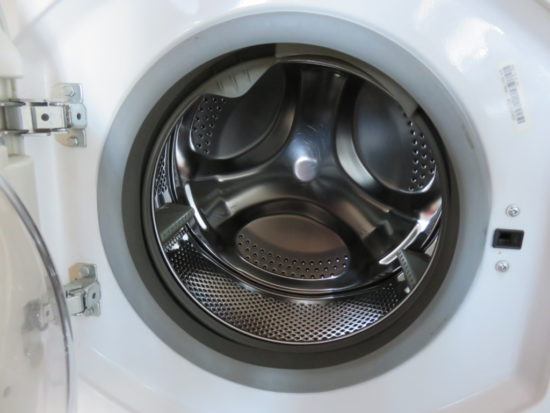

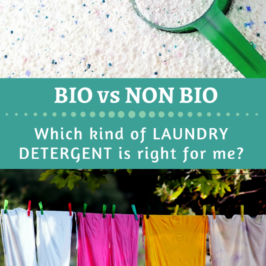
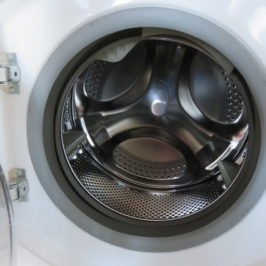

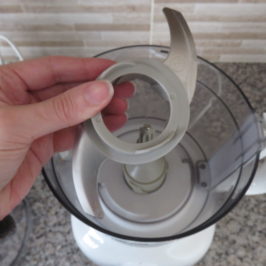
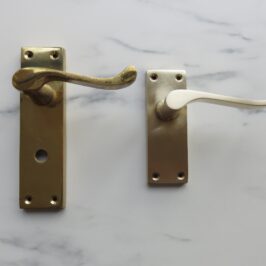
Eileen Benson
I was surprised when you said that hard water can actually lower the efficiency of laundry detergent in addition to leaving our clothes feeling stiff and dingy. My husband and I moved for his work last month, and we’ve noticed a lot of hard water stains on our dishes ever since. I didn’t realize all of the negative effects that hard water has, so thanks for sharing this article and bringing them to my attention!